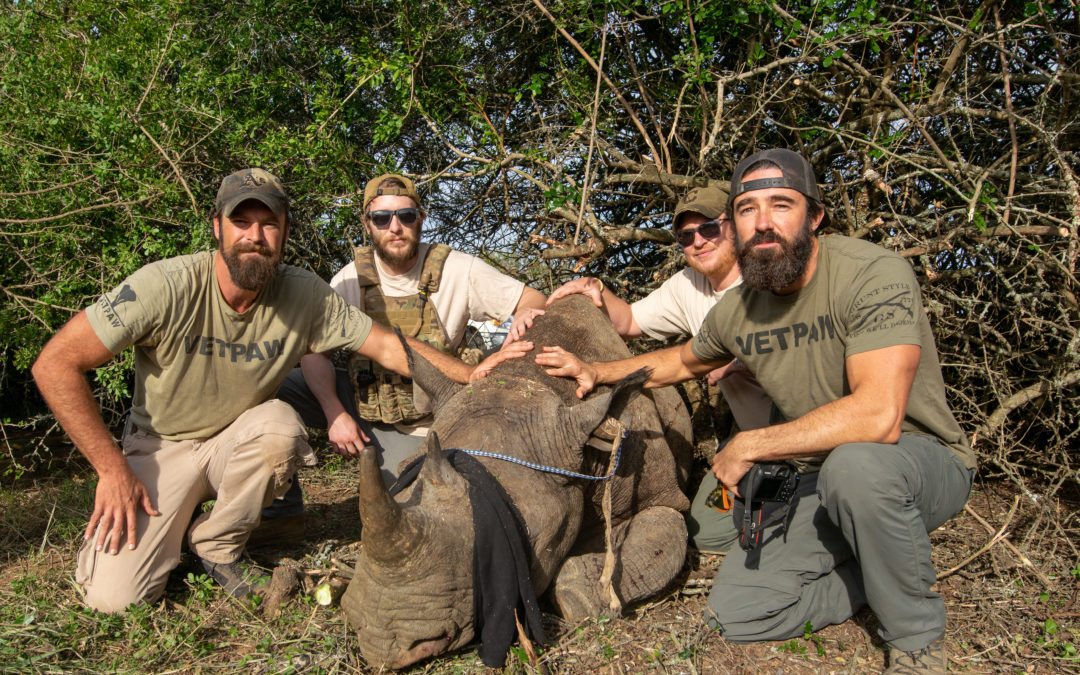FROM THE VETPAW TEAM IN SOUTH AFRICA
COVID-19 is taking a detrimental toll in many facets of the world and the conservation industry is no exception. With international travel restrictions and tourism halted indefinitely, many non-profits and conservation organizations against poaching are struggling to bring in the necessary funds to remain effectively operational.
COVID-19 is escalating economic hardships on the people who rely on tourism as a means for survival.
As you probably know, Vetpaw provides anti poaching jobs for ex military members, placing them on reserves in Africa. Our Vetpaw team members on the ground in South Africa have a unique perspective of COVID-19 and its effects on conservation. This is our thoughts on COVID-19, conservation and how poacher hunting could increase during the pandemic.
AFRICAN POACHING, CONSERVATION AND TOURISM
Many game reserves, conservation farms, anti-poaching units, organizations against poaching, non-profit organizations and other conservation allies rely on tourism and donations for funding. Some are shutting down completely, while others are hurting to stay in business and selling off their assets.
According to the World Travel and Tourism Council, wildlife-based tourism in Africa employs 3.6 million people and generates over 29 billion dollars annually.
With constraints on tourism and travel, some African countries are experiencing increased poaching activity, unable to afford essential equipment and anti-poaching units like Vetpaw. But tourism doesn’t just help fund conservation and anti-poaching, it also incentivizes governments to help protect wildlife and habitats that may not receive sufficient aid otherwise.
Travel restrictions and the economic fallout of COVID-19 have caused many reserves to shut down permanently, sell off their assets, and/or layoff key personnel. The more training African rangers and field guides have, the more expensive they are to compensate. Due to COVID-19, many wildlife habitats are now unable to afford properly trained, honest rangers and staff.
Without funding from tourism, many of the wildlife reserves that remain operational are operating in less than ideal conditions, unable to afford essential, experienced staff and critical supplies.
VETPAW CONTINUES COMBATING AFRICAN POACHING
The staff that does remain employed faces an increased chance of exhaustion, complacency and lowered morale. Against all odds, the Vetpaw team members in Africa have been able to mitigate these negative effects and manage operations at 100% effectiveness. While most Vetpaw deployments last three months before taking some time off, the on-ground team has been working around the clock for the better part of 2020.
For other game reserves and wildlife farms, these conditions have elevated the poaching threat level while reducing the means of protecting African wildlife.
BUSHMEAT POACHER HUNTING ON THE RISE
Poverty-stricken communities that depend on tourism for income are in dire need of aid. Some of the residents rely on game reserves for work, some rely on tourists to sell goods and services, and others rely on the kindness of strangers for a ride to get groceries. COVID-19 has brought all of this to a screeching halt, which also increases the consumption of bushmeat. Some people are unable to find other options for survival aside from bushmeat poaching.
With many ecosystems and wildlife populations already near tipping points, the current crisis may result in population declines, local extinctions of some species, and intensified disruptions of ecological processes. It’s very possible that bushmeat poacher hunting will continue to increase on private farms and reserves.
WHAT HAVE WE LEARNED?
One of the biggest indicators for the success of game farms and wildlife reserves during a pandemic is their ability to diversify. Farms that have diverse offerings have been able to adapt and remain effective in the war on poaching. While most game reserves and wildlife farms rely on tourism as their main source of income, some have turned to arts and eCommerce to supplement the loss of income. Produce farming, selling photography, creating and selling goods made from African natural resources – these are all viable options in this new landscape, although it may not be as lucrative as a business.
WHAT CAN YOU DO TO COMBAT POACHER HUNTING DURING COVID-19?
Reducing support for African wildlife conservation at this critical point in history could undo years and years of progress. By donating to Vetpaw, you will help us buy essential equipment for keeping African wildlife safe during the COVID-19 epidemic. Your funding will help us train more local African rangers, educate and empower local communities and employ more skilled workers to defend African wildlife.
If you’d like to help save the rhinos, you can make a donation here or donate essential items by contacting shea.peaton@vetpaw.org.
Interested in anti poaching jobs for ex military? Join our team at vetpaw.org/careers.

